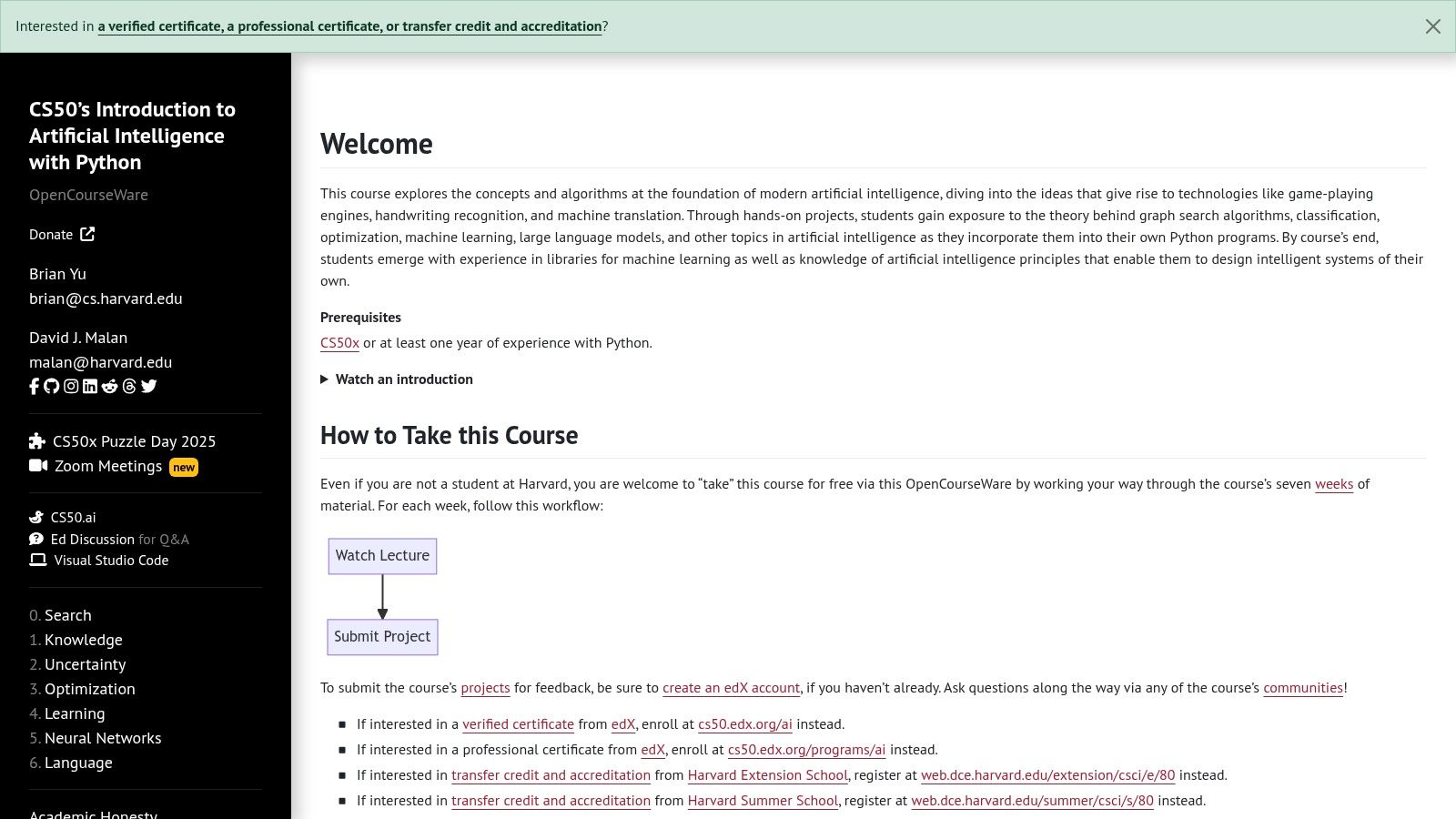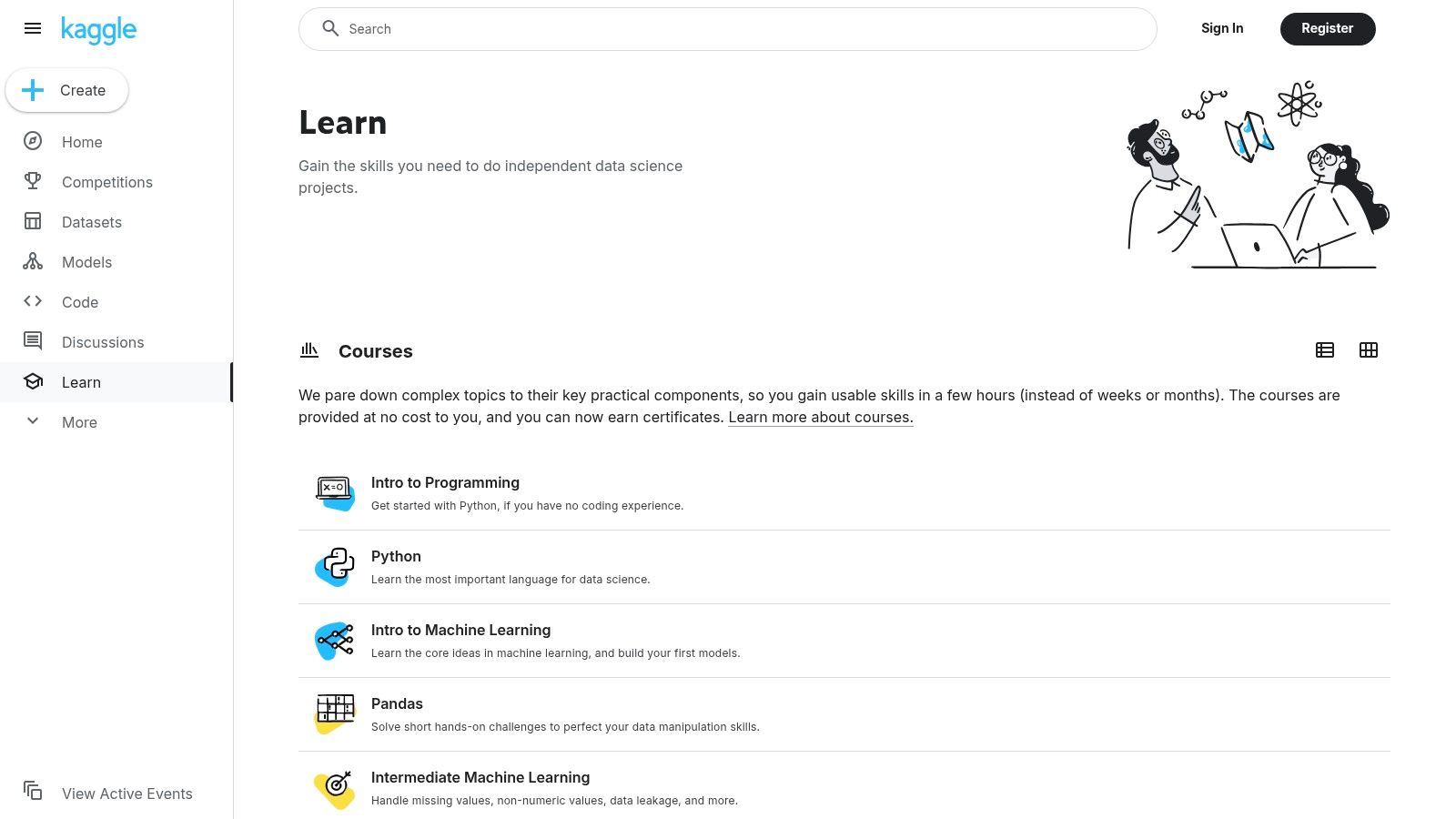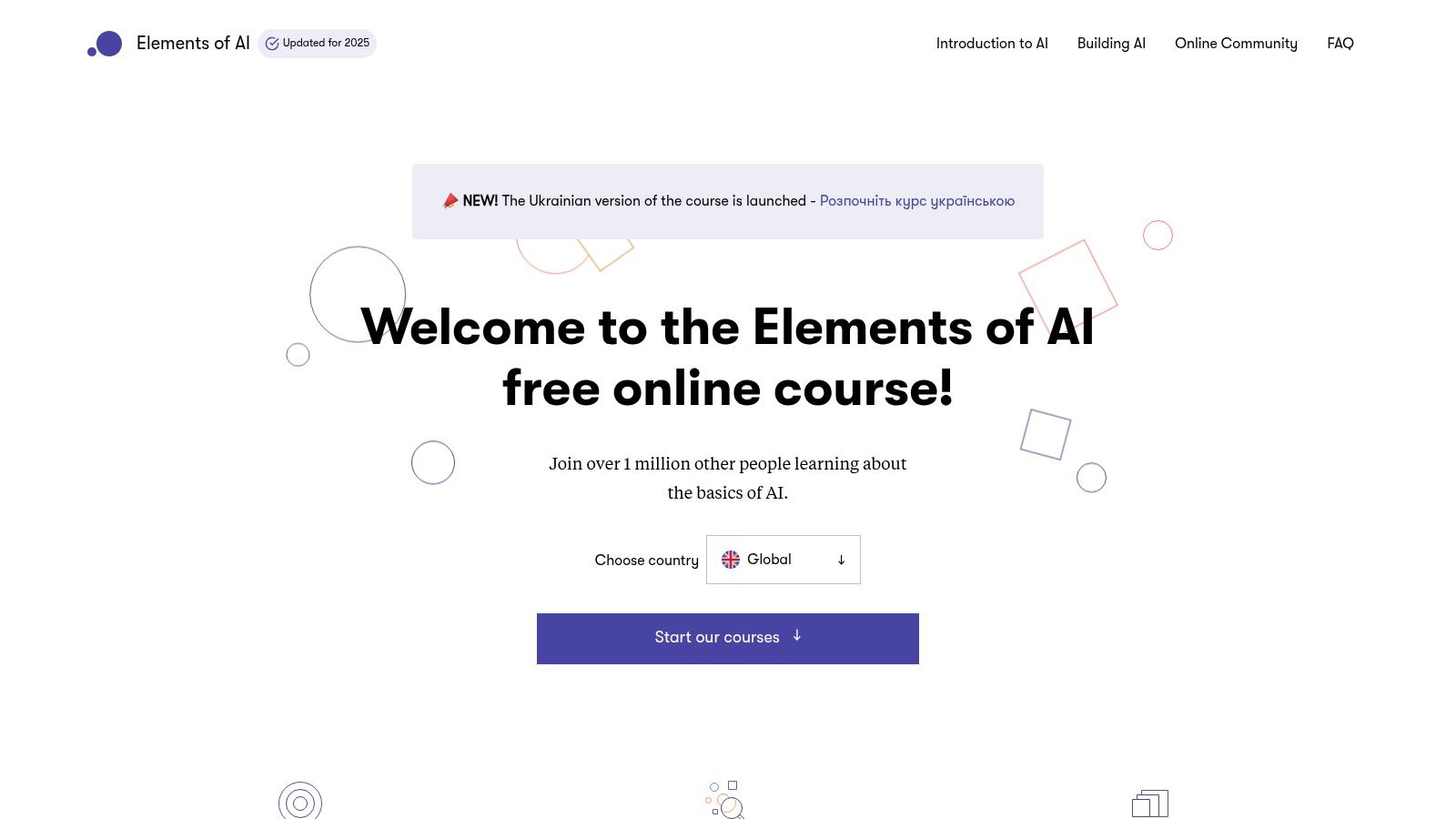Kickstart Your AI Journey in 2025
Want to learn how to use AI to boost your creativity and automate your work? This list of 8 top AI courses for beginners will teach you practical AI skills, no prior experience required. Discover the power of prompt engineering, vibe coding, selecting the right LLM for the job, and building automated workflows with tools like Zapier and n8n. These courses solve the problem of breaking down complex AI concepts into digestible lessons, empowering you to start building with AI today.
1. Machine Learning for Everyone by University of London (Coursera)
Embarking on your AI journey can feel daunting, especially with the buzz around complex concepts like prompt engineering, LLMs, and workflow automation. If you're a non-technical enthusiast, hobbyist vibe builder, or someone exploring AI for go-to-market strategies, finding the right starting point is crucial. The "Machine Learning for Everyone" course by the University of London on Coursera provides an excellent foundation, specifically designed for beginners with no prior technical experience. This course demystifies core machine learning concepts, algorithms, and real-world applications using accessible language and engaging visuals, making it a perfect entry point into the broader AI landscape. It lays the groundwork for understanding how AI tools work, which is invaluable even if your primary focus is areas like vibe coding or leveraging LLMs for specific business outcomes.

While this course doesn't dive deep into specialized topics like prompt engineering, individual LLM model comparisons, or the intricacies of Zapier/n8n workflows, understanding the fundamentals of machine learning is highly beneficial. This knowledge will empower you to grasp the underlying principles powering these advanced tools. For instance, understanding supervised and unsupervised learning, covered in this course, will give you a better grasp of how LLMs are trained and how to interpret their outputs. Think of it as building a strong base before constructing the specialized floors of your AI knowledge skyscraper.
The course boasts several attractive features. No prior programming experience is required, removing a significant barrier for many beginners. Interactive visualizations and simulations make learning engaging and intuitive. The curriculum covers both supervised and unsupervised learning, exposing you to a broad range of machine learning techniques. Real-world case studies from various industries demonstrate the practical applications of these concepts, connecting the theoretical with the tangible. Upon completion, you receive a certificate, adding a valuable credential to your portfolio. Learn more about Machine Learning for Everyone by University of London (Coursera)
This beginner-friendly approach makes it ideal for those new to AI. The high-quality university content ensures a robust learning experience, and the strong community support and forums provide a valuable resource for addressing any questions or challenges. The flexible, self-paced learning structure allows you to progress at your own speed, accommodating busy schedules. Pricing falls within the Coursera subscription model, typically ranging from $39-79/month, which unlocks access to a vast library of other courses as well.
However, it’s important to acknowledge the limitations. While the course provides a strong theoretical foundation, it offers limited hands-on coding practice. This might be a drawback if your ultimate goal involves building your own AI models or diving into the technical aspects of platforms like Replit. For advanced learners seeking in-depth technical explorations, the content might feel less challenging. Nevertheless, for beginners seeking a comprehensive and accessible introduction to machine learning, particularly those focused on the practical application of AI tools rather than the intricate technical details, "Machine Learning for Everyone" serves as an excellent launching pad. This foundation will prove invaluable as you explore more specialized areas like prompt engineering, vibe coding, and leveraging LLMs for specific business outcomes through workflow automation platforms like Zapier and n8n. It provides the necessary context and understanding to effectively utilize these tools and unlock their full potential in your AI journey.
2. CS50's Introduction to Artificial Intelligence with Python (Harvard)
Dive into the fascinating world of Artificial Intelligence with this beginner-friendly course offered by Harvard University. CS50's Introduction to Artificial Intelligence with Python provides a solid foundation in AI concepts, blending theoretical knowledge with practical Python programming exercises. This makes it a great starting point for anyone looking to understand the core principles driving today's AI revolution, even those new to programming. While this course doesn't specifically cover vibe coding, prompt engineering, individual LLM model comparisons, or workflow automation platforms like Zapier and n8n, it lays the groundwork for understanding how these technologies function under the hood. It equips you with the fundamental knowledge necessary to delve into more specialized AI areas like those mentioned above. By understanding search algorithms, knowledge representation, and machine learning, you'll be better prepared to craft effective prompts, interpret LLM outputs, and design intelligent automated workflows.

This course stands out amongst other ai courses for beginners because of its prestigious pedigree and comprehensive curriculum. It covers a broad spectrum of AI topics including search algorithms, knowledge representation, machine learning, and neural networks. Imagine building a simple game AI that can strategically outmaneuver its opponents, or developing a program that can understand and respond to human language – this course gives you the tools to make these ideas a reality. You'll learn how machines can "think" and "learn" through practical Python projects, providing a tangible understanding of abstract AI concepts. This hands-on approach is invaluable for anyone looking to apply AI in real-world scenarios. For example, understanding search algorithms can later be applied to optimizing content for specific keywords, a core component of "vibe marketing." Similarly, grasping knowledge representation helps in structuring data for effective prompting of LLMs.
One of the biggest advantages of CS50's AI course is its accessibility. All course materials are available for free, allowing anyone with an internet connection to learn from Harvard's renowned faculty. This open access makes it a truly democratic resource for aspiring AI enthusiasts, hobbyist vibe builders, and anyone looking to explore the potential of AI. The practical project-based learning, using Python, gives you the skills to experiment with basic AI implementations, which is a great stepping stone towards more advanced applications like prompting LLMs or automating tasks with platforms like Replit, n8n, and Zapier.
While free access to the course content is a huge plus, obtaining a verified certificate does come at an additional cost of $199. This certificate can be a valuable addition to your resume, showcasing your commitment to learning and understanding AI principles. However, even without the certificate, the knowledge and skills gained from the course are highly valuable.
While designed for beginners, some prior programming experience is recommended to get the most out of this course. The curriculum is quite fast-paced, covering a lot of ground in a relatively short time. This can be challenging for those completely new to programming. Furthermore, interaction with instructors is limited, relying primarily on online forums and resources for support. This self-directed learning approach requires a degree of self-discipline and motivation.
Despite these minor drawbacks, CS50's Introduction to Artificial Intelligence with Python offers an exceptional opportunity to delve into the world of AI. The combination of free high-quality content, prestigious Harvard instruction, and a strong programming foundation makes it a top choice for beginners serious about learning AI. It provides the foundational knowledge required to explore further into specialized AI areas, including prompt engineering, understanding individual LLMs, and leveraging workflow automation platforms for specific business outcomes. You can access the course materials and begin your AI journey at https://cs50.harvard.edu/ai/.
3. AI For Everyone by Andrew Ng (Coursera)
Navigating the world of Artificial Intelligence can feel daunting for beginners, especially if you're not a coder. "AI For Everyone" by Andrew Ng on Coursera aims to bridge that gap, offering a non-technical, business-focused approach to understanding AI's transformative power. This course is designed specifically for individuals seeking to grasp AI's potential impact across various industries without delving into complex coding. It prioritizes understanding AI strategy, implementation, and ethical considerations, making it a valuable starting point for non-technical AI enthusiasts, hobbyist vibe builders, and those interested in leveraging AI for go-to-market strategies and workflow automations.

While "AI for Everyone" provides a solid foundational understanding of AI concepts, it's important to acknowledge that its scope doesn't encompass the specifics of prompt engineering, "vibe coding" (a nascent area focusing on the emotional impact of code and user experience), in-depth exploration of individual LLMs, or hands-on practice with workflow automation platforms like Zapier and n8n. For those particular skills, further specialized courses or resources will be necessary. However, this course lays the groundwork by explaining the broader context within which these tools and techniques operate. Understanding the strategic implications of AI empowers you to effectively utilize tools like Zapier or n8n for specific business outcomes. Learn more about AI For Everyone by Andrew Ng (Coursera)
This course excels in demystifying AI jargon and illustrating real-world applications across diverse industries. The curriculum uses case studies and examples to demonstrate how businesses are leveraging AI to enhance efficiency, improve decision-making, and create new products and services. Imagine understanding how AI is transforming customer service through chatbots, optimizing supply chains through predictive analytics, or personalizing marketing campaigns through machine learning – all without needing to write a single line of code.
Structured as a 4-week program, "AI For Everyone" offers a digestible learning experience, accessible even for busy professionals. The availability of mobile app learning support further enhances flexibility. Taught by renowned AI expert Andrew Ng, the course benefits from his extensive experience and clear teaching style. This course is perfect for business professionals seeking to integrate AI into their strategies and understand its implications for their respective industries. The absence of technical prerequisites ensures accessibility for everyone.
While the course's non-technical approach is a major advantage for beginners, it also presents a limitation for those seeking hands-on technical practice. The curriculum doesn't involve coding or working with specific AI tools. Additionally, the course requires a Coursera subscription, which typically costs between $39 and $79 per month. The relatively short duration might also feel rushed for some learners, especially when considering the breadth of the topic. While the course touches upon ethical considerations, the limited timeframe restricts in-depth exploration of this crucial aspect. The focus is primarily on high-level concepts and strategic thinking rather than the intricacies of technical implementation.
If your goal is to understand the "what" and "why" of AI in business without getting bogged down in the "how" of coding, then "AI For Everyone" provides an excellent entry point. It’s an ideal choice for anyone looking for a quick, yet comprehensive, overview of the business implications of AI, providing a strong foundation for exploring more specialized areas like prompt engineering or workflow automation later on. This course empowers you with the knowledge to identify AI opportunities within your organization, communicate effectively with technical teams, and make informed decisions about AI adoption and implementation. This foundational understanding of AI principles and applications equips you to appreciate the potential of technologies like LLMs and effectively plan business results using tools like Zapier and n8n, even without directly engaging in their technical operation during this initial stage of learning. This course helps you effectively identify the specific problems where these tools can be applied and understand the scope of their potential solutions.
4. Introduction to Artificial Intelligence (AI) by IBM (edX)
IBM's "Introduction to Artificial Intelligence (AI)" course on edX offers a comprehensive overview of AI fundamentals for beginners. While it doesn't dive deep into niche topics like "vibe coding," which is still an evolving area, it provides a solid foundation in core AI concepts, including machine learning and cognitive computing, making it a valuable starting point for anyone interested in the field. This course stands out due to its practical approach, offering hands-on experience with IBM Watson and cloud-based AI tools, giving learners valuable real-world skills applicable in various industries. For those looking to explore AI for go-to-market strategies, AI workflow automations, or simply understanding the basics of prompting LLMs, this course provides a useful framework.

One of the key advantages of this course is its accessibility. A free audit option allows learners to explore the materials and get a feel for the content before committing to a paid certificate. This is particularly appealing for hobbyist vibe builders or non-technical AI enthusiasts who want to explore the field without a significant financial investment. For those seeking a recognized credential, a professional certificate track is available for a fee, ranging from $99 to $299. This allows learners to demonstrate their acquired skills and knowledge to potential employers, enhancing their career prospects in the growing field of AI.
While this course excels in providing practical experience with IBM's ecosystem, including Watson and cloud-based tools, its focus on a specific platform is also a potential drawback. Learners primarily interact with IBM's tools and may not gain as much exposure to other industry-standard tools and platforms. This can limit the breadth of their skillset compared to courses that cover a wider range of technologies. Although the course provides a good overview of AI concepts, it's worth noting that it's less theoretically focused. Individuals seeking a deep dive into the mathematical underpinnings of AI algorithms might find this aspect lacking. Similarly, programming instruction is limited, which might be a consideration for those aspiring to become AI developers. However, for beginners focused on practical application and high-level understanding, the limited programming focus can be an advantage, making the course more approachable.
For those interested in implementing AI solutions for specific business outcomes using workflow automation platforms like Zapier and n8n, this course can serve as a foundational step. While it doesn't directly cover these specific platforms, it introduces core AI concepts relevant to automating tasks and processes. You can Learn more about Introduction to Artificial Intelligence (AI) by IBM (edX) to see how these concepts can be applied in practice. This external resource may provide additional insights on bridging the gap between AI fundamentals and practical implementation using automation tools.
While this IBM course doesn't explicitly cover prompt engineering for individual LLMs or delve into the nuances of selecting the right model for a specific use case, it does offer a strong foundation in the broader context of AI. Understanding the underlying principles of AI, machine learning, and cognitive computing helps learners grasp the capabilities and limitations of LLMs, preparing them for further exploration in the rapidly evolving landscape of prompt engineering and LLM applications. This course offers a practical, industry-relevant introduction to AI, especially valuable for beginners interested in leveraging AI for business applications, vibe marketing, or simply gaining a foundational understanding of this transformative technology. This course is a strong contender among ai courses for beginners, offering a valuable blend of theoretical knowledge and practical experience with enterprise-grade tools.
5. Python for AI & Development by IBM (Coursera)
Embarking on your AI journey can feel daunting, especially if you're starting from scratch. This IBM course on Coursera offers a structured path to learning both fundamental Python programming and its application within the exciting realm of artificial intelligence. This course is particularly valuable for those interested in practical AI implementation, covering everything from basic data structures to leveraging powerful machine learning libraries like scikit-learn. For aspiring "vibe builders," this foundation in Python can unlock a world of possibilities, from automating vibe marketing tasks to building custom AI tools for go-to-market strategies.

While this particular course doesn't delve deeply into specialized topics like prompt engineering, "vibe coding" (a nascent and evolving area), or individual LLM comparisons (which are rapidly changing), its focus on Python fundamentals is crucial. A strong grasp of Python is the bedrock upon which you can build more advanced AI skills. Think of it as learning the grammar of a language before crafting eloquent poetry – in this case, the poetry of AI. Once you're comfortable with Python, you'll be well-equipped to explore the nuances of prompt engineering and tailor your interactions with specific LLMs for optimal results. You can even find resources to enhance your skills, such as those available at Learn more about Python for AI & Development by IBM (Coursera).
This course emphasizes practical skills, equipping you with the knowledge to manipulate data using Pandas and NumPy, essential libraries for any AI enthusiast. Imagine effortlessly analyzing customer data to understand vibe preferences, or automating the generation of personalized marketing content. These are just a few examples of the power you'll gain. The inclusion of web development and API integration opens doors to connecting your AI solutions with other platforms, enabling seamless workflows and automation. Think of integrating your AI models with workflow automation platforms like Zapier or n8n to streamline your go-to-market strategy, automatically triggering marketing campaigns based on real-time AI insights. This practical approach makes it a strong contender amongst the best ai courses for beginners.
The course structure strikes a good balance between theory and hands-on practice, featuring labs and projects to solidify your learning. This is particularly beneficial for non-technical learners and hobbyist vibe builders, allowing them to apply their newfound knowledge in concrete ways. For those seeking to create AI-powered tools for specific business outcomes, this practical experience is invaluable. For instance, you could build a tool that automatically generates personalized prompts for LLMs based on customer data, effectively automating a key step in your content creation workflow.
This IBM Coursera offering, while a great starting point, does come with some considerations. First, the subscription-based pricing model ($39-79/month) requires a financial commitment. Second, while beginner-friendly in its approach to Python, complete novices might find the learning curve initially steep, particularly the programming component. Finally, the course focuses on foundational concepts and doesn't cover advanced AI topics in detail. However, these limitations are outweighed by the strong programming foundation you'll gain, enabling you to explore specialized areas like prompt engineering and LLM interactions more effectively in the future. This course lays the groundwork for your future explorations in the vibrant world of AI, equipping you with the essential tools and skills to bring your AI-powered visions to life.
6. Intro to Machine Learning by Kaggle Learn
For beginners eager to dive into the practical side of AI, particularly machine learning, Kaggle Learn's introductory micro-course series is an excellent starting point. This free resource offers a concise and hands-on approach, allowing you to quickly grasp core machine learning concepts without getting bogged down in complex theory. While it doesn't delve into the nuances of prompt engineering, vibe coding, or specific LLM models – aspects crucial for those interested in vibe marketing, AI for go-to-market, and LLM prompting – its strong practical focus on machine learning fundamentals provides a valuable foundation for further exploration of these more specialized AI areas. Think of it as building a solid base upon which you can later construct the exciting world of LLMs, workflow automations, and all the other fascinating aspects of AI you’re eager to explore.

This micro-learning format, clocking in at just 15-20 hours total, makes it perfect for busy individuals and hobbyists. The course cleverly integrates real Kaggle datasets and competitions, giving you a taste of how real-world data science projects work. You’ll be working with Python and pandas, two industry-standard tools, further enhancing the practical skills you'll gain. And the best part? It's completely free, with no hidden costs or subscription fees.
While Kaggle Learn doesn't directly cover prompt engineering, which is crucial for effectively interacting with LLMs like ChatGPT or Bard, the machine learning principles you learn here lay the groundwork for understanding how these models process and generate text. For example, understanding concepts like regression and classification can help you appreciate how LLMs predict the next word in a sequence or categorize text into different sentiments. This foundational knowledge is beneficial even if your primary interest lies in using platforms like Zapier or n8n to automate AI workflows. Knowing how the underlying AI models operate will enable you to design more efficient and effective automations.
For those specifically interested in "vibe coding," a term often associated with crafting compelling prompts to evoke specific emotions or styles in LLM-generated content, Kaggle Learn's course serves as a valuable stepping stone. While the course doesn't explicitly teach vibe coding techniques, it provides the foundational understanding of data manipulation and analysis necessary for crafting nuanced prompts that influence LLM outputs. Think of it as learning the alphabet before trying to write a novel.
Similarly, while Kaggle Learn doesn’t dive into the specifics of individual LLMs, their strengths, weaknesses, and ideal use cases, it equips you with the basic machine learning concepts that underpin all these models. This understanding will be invaluable as you venture further into the world of LLMs and start exploring platforms like Replit for building your own AI-powered applications.
One of the biggest advantages of Kaggle Learn is its focus on real-world application. Imagine you're a marketing professional looking to use AI for go-to-market strategy. By learning the basics of machine learning through Kaggle Learn, you can begin to understand how to analyze customer data, identify trends, and even build predictive models for campaign performance. This knowledge will also be crucial when integrating AI tools into your workflow automation platforms like Zapier and n8n, allowing you to automate tasks based on data-driven insights.
Despite its many advantages, Kaggle Learn does have some limitations. It's crucial to note that it assumes some basic Python knowledge, so complete novices may find it challenging. The course also provides limited theoretical depth and lacks instructor support. However, the hands-on experience with real datasets and the free access more than make up for these limitations, especially for beginners focused on practical skills and quick wins. If your primary interest is AI for practical business results, starting with a strong understanding of machine learning principles through Kaggle Learn is an excellent first step on your AI journey. You can then explore more specialized resources and courses that delve into the exciting world of LLMs, prompt engineering, and AI workflow automation. The course is available at https://www.kaggle.com/learn.
7. Artificial Intelligence A-Z: Learn How To Build An AI (Udemy)
This Udemy course, "Artificial Intelligence A-Z: Learn How To Build An AI," offers a deep dive into AI development using Python. While its primary focus is on building AI from the ground up using coding, covering topics like deep learning, reinforcement learning, and neural networks, it offers valuable foundational knowledge beneficial for anyone interested in AI, including those focused on prompt engineering, workflow automation, and leveraging LLMs for business results. By understanding the underlying mechanics of AI, you’ll be better equipped to leverage the power of existing tools and platforms. This course teaches you how these tools actually work, giving you a powerful edge.

For the aspiring “vibe coder” – someone focused on achieving a specific outcome or "vibe" using AI tools – this course provides the underlying technical understanding crucial for effective prompt engineering. While not directly teaching prompt engineering for specific LLMs like GPT-3 or Bard, understanding neural networks and how AI models process information is essential to crafting effective prompts. You'll gain insights into how these models “think,” enabling you to create prompts that elicit the desired responses and create the vibe you’re after. This is particularly important for individuals seeking to leverage AI for go-to-market strategies and vibe marketing, where understanding the nuances of AI-generated content is paramount.
While this course doesn’t directly cover workflow automation platforms like Zapier or n8n, its focus on AI development provides a solid base for understanding how AI can be integrated into these workflows. By learning how to build AI models, you can better appreciate the capabilities and limitations of AI-powered automation tools. This is particularly useful for automating business processes where an understanding of AI principles can lead to more effective and efficient automation strategies. You'll be able to design workflows that incorporate AI elements more thoughtfully, understanding how to leverage AI’s strengths within platforms like Zapier or n8n.
For beginners keen on exploring different LLMs and their individual strengths, this course offers a great starting point. It may not offer a detailed comparison of each model, but its broader approach to AI fundamentals makes it easier to grasp the underlying technology powering these models. This knowledge is crucial for understanding how different architectures can influence the performance and suitability of an LLM for a specific use case. The course's focus on Python is also a plus, as many advanced LLM interactions and customizations utilize this language.
One of the standout features of "Artificial Intelligence A-Z" is the emphasis on hands-on project work. Building six different AI projects, including a self-driving car simulation and neural network development from scratch, allows you to apply theoretical concepts in a practical context. This practical experience can be invaluable for individuals looking to build their own AI tools or integrate AI into existing projects, whether that be crafting compelling marketing copy, generating creative content, or automating complex business workflows. The course also offers lifetime access, providing ongoing value as the field of AI rapidly evolves.
While "Artificial Intelligence A-Z" offers comprehensive coverage of AI fundamentals, it's essential to be aware of its potential drawbacks. The 22+ hour duration requires a significant time investment. The pace might be challenging for complete beginners with no prior coding experience. The course's format offers limited instructor interaction. Pricing can vary between $50 and $200 depending on Udemy’s frequent promotions. Keep an eye out for sales to maximize your value.
Finally, if you're a beginner interested in ai courses for beginners that cover a broad range of AI concepts while providing a strong technical foundation, "Artificial Intelligence A-Z: Learn How To Build An AI" on Udemy (https://www.udemy.com) is a solid option. While it may require significant time and effort, the hands-on experience and in-depth curriculum provide a solid understanding of how AI works, setting you up for success in leveraging AI, regardless of your specific use case – whether it's prompt engineering, workflow automation, or simply understanding the fascinating world of artificial intelligence.
8. Elements of AI by University of Helsinki
Looking to dip your toes into the exciting world of artificial intelligence but feeling overwhelmed by the technical jargon? The University of Helsinki's Elements of AI course is an excellent starting point for beginners, offering a comprehensive introduction to AI concepts without requiring any prior knowledge. This free program demystifies AI for the general public, blending theory with practical exercises, making it an ideal choice for non-technical AI enthusiasts and hobbyist vibe builders. While it doesn't delve deeply into niche topics like “vibe coding,” it provides a solid foundation to explore those areas later.

Elements of AI distinguishes itself by focusing on the broader societal implications of artificial intelligence, including AI ethics. This makes it particularly relevant for those interested in understanding the responsible use of AI in areas like vibe marketing and go-to-market strategies. The course covers fundamental concepts like machine learning and neural networks, giving you a strong theoretical base for understanding how AI works. While the course doesn't specifically cover individual LLMs, prompt engineering, or workflow automation platforms like Zapier and n8n, the knowledge gained here forms a crucial stepping stone towards mastering those more advanced techniques. By grasping core AI principles, you'll be better equipped to understand the "why" behind specific LLM choices and their applications in different business scenarios.
One of the most appealing aspects of Elements of AI is its accessibility. Being completely free with no prerequisites, it opens doors to high-quality education for anyone curious about AI. The self-paced, flexible learning structure allows you to learn at your own speed, fitting it around your existing commitments. This is particularly beneficial for those juggling hobbies, like vibe building, with other responsibilities. The interactive exercises and quizzes reinforce learning, ensuring you grasp the key concepts. The course is also available in multiple languages, further broadening its reach.
While the course excels in theoretical foundations, it does have some limitations. It offers limited hands-on coding practice, meaning you won't be building AI applications from scratch. This can be a drawback for those eager to dive into practical implementation, especially in areas like workflow automation with n8n or Zapier. Furthermore, no official certificate is offered upon completion, which might be a consideration for those looking for formal recognition. The content also leans more towards academic understanding than industry-specific applications. Learn more about Elements of AI by University of Helsinki for further insights into its structure and benefits.
For those interested in ai courses for beginners, Elements of AI deserves a place in this list because it provides a robust and accessible entry point into the world of artificial intelligence. It equips you with a fundamental understanding of AI's core principles and societal impact. While it might not cover specialized areas like prompt engineering or specific LLM use cases directly, it lays the groundwork for future exploration in those fields. If you're looking to build a strong theoretical foundation in AI and understand its broader implications, Elements of AI is an excellent choice. You can access the course through their website: https://www.elementsofai.com. Once you've solidified your understanding through this course, you'll be well-prepared to delve into more specialized topics like prompt engineering, understanding individual LLMs, and leveraging workflow automation platforms for specific business results, making this a valuable first step in your AI journey.
Top 8 AI Beginner Courses Comparison
| Course Title | Core Features / Highlights | User Experience / Quality ★ | Value Proposition 💰 | Target Audience 👥 | Unique Selling Points ✨ |
|---|---|---|---|---|---|
| Machine Learning for Everyone (University of London) | Beginner-friendly, no coding needed, cert. | ★★★★☆ Flexible, visual, community | 💰 $39-79/month, subscription | 👥 Beginners & hobbyists | 🏆 University content, visualizations |
| CS50's Intro to AI with Python (Harvard) | Hands-on Python projects, free materials | ★★★★☆ Prestigious, practical | 💰 Free access, $199 cert. optional | 👥 Learners with programming basics | 🏆 Harvard instructor, project-based |
| AI For Everyone (Andrew Ng) | Non-technical, business focus, 4-week | ★★★★☆ Practical, mobile supported | 💰 $39-79/month, subscription | 👥 Business pros & beginners | ✨ AI strategy & ethics by Ng |
| Introduction to AI (IBM, edX) | IBM Watson labs, cloud AI tutorials | ★★★★☆ Industry relevant, hands-on | 💰 Free audit, $99-299 certificate | 👥 Career-driven beginners | 🏆 Enterprise tools experience |
| Python for AI & Development (IBM) | Python basics, AI libraries, hands-on | ★★★★☆ Balanced theory & practice | 💰 $39-79/month subscription | 👥 Beginner programmers | ✨ Focus on AI dev & APIs |
| Intro to Machine Learning (Kaggle Learn) | Free micro-course, real datasets | ★★★☆☆ Quick, hands-on | 💰 Completely free | 👥 Beginners with Python knowledge | ✨ Kaggle competitions integration |
| Artificial Intelligence A-Z (Udemy) | 6 AI projects, advanced topics, lifetime access | ★★★★☆ Extensive, project-heavy | 💰 $50-200 one-time | 👥 Self-paced advanced beginners | 🏆 Deep reinforcement & project focus |
| Elements of AI (University of Helsinki) | Free, multi-language, ethical focus | ★★★★☆ Theoretical & flexible | 💰 Completely free | 👥 General public & theory enthusiasts | ✨ Ethics & societal AI impact included |
Level Up Your AI Skills with VibeMakers
So, you're ready to dive into the exciting world of AI? This list of AI courses for beginners offers a fantastic starting point, covering everything from foundational machine learning concepts to practical Python skills. We've explored options from leading institutions like Harvard, IBM, and the University of London, providing a solid base for understanding AI fundamentals. Key takeaways include the importance of understanding different LLM models and their specific use cases, mastering prompt engineering techniques for effective communication with AI, and leveraging workflow automation platforms like Zapier and n8n to achieve tangible business results. Remember, picking the right course depends on your learning style and goals. Do you prefer hands-on projects or theoretical deep dives? Identifying your needs will help you maximize your learning experience.
For those particularly interested in prompt engineering, "vibe coding," understanding individual LLMs, and implementing AI-powered workflow automations, focusing on courses that emphasize these areas will be crucial. Consider exploring courses that offer practical application examples for marketing, go-to-market strategies, and other business-related use cases. As you begin your AI journey, remember that consistent practice and experimentation are key. Don't be afraid to try different approaches, explore various tools like Replit, and build your own unique “vibe” with AI.
Ready to connect with a supportive community and take your AI skills to the next level? VibeMakers offers exclusive resources, workshops, and job opportunities tailored for non-technical AI enthusiasts, hobbyists, and professionals looking to integrate AI into their careers. Join VibeMakers today and unlock your full AI potential! VibeMakers We provide the perfect environment to continue your AI learning journey, connect with like-minded individuals, and explore the endless possibilities of this transformative technology.